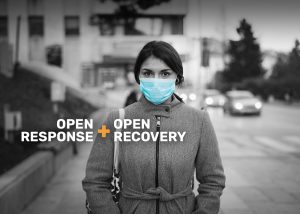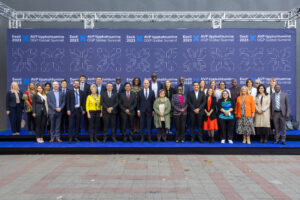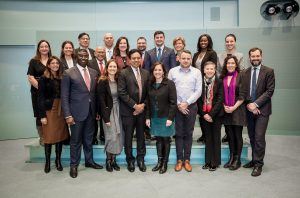Reflections on an Unprecedented Year
Reflexiones en un año sin precedentes
September is often a time for new beginnings, as it marks a change in season, and we all begin to feel the calendar year drawing to a close. For the OGP Steering CommitteeThe Steering Committee is OGP’s executive decision-making body. Its role is to develop, promote and safeguard OGP’s values, principles and interests; establish OGP’s core ideas, policies, and ru... co-chairsThe leadership of the Steering Committee is made up of four co-chairs who provide strategic guidance and support to advance OGP’s overarching priorities. Co-Chairs serve two-year terms beginning on ..., it is also a time for closure and reflection. In this pandemic year, full of pain for so many, we’ve had the honor of working together across sectors and continents to support the open government cause. As we look back on 2020 and indeed look forward to the multi-stakeholder movement around us, we wanted to take stock of what’s happened across the Partnership and in the name of open government over the past twelve months.
It’s fair to say that our year as co-chairs involved both change and unpredictability. First, a new government was elected in Argentina. The Cabinet Office not only reaffirmed its commitmentOGP commitments are promises for reform co-created by governments and civil society and submitted as part of an action plan. Commitments typically include a description of the problem, concrete action... to the OGP co-chair mandate, but also demonstrated open government is a movement that delivers for citizens and is not specific to political colors or party flags. Then there was what no one could have foreseen: the spread of COVID-19 in early 2020.
When the pandemic changed all our lives, OGP was able to pivot quickly to prove that the values of open government – transparency, accountability, participation and inclusion – are essential in times of crisis and uncertainty. As OGP co-chairs, we oversaw the launch of the Open Response + Open Recovery campaign that initially crowdsourced open government actions being taken across the globe. Our aim was to encourage open government approaches to the pandemic, when moving from response to recovery. It was also for the OGP community to learn from each other and begin to establish best practices, which we captured and shared in an open government guide.
We also worked with many partners to host a series of online thematic events and regional dialogues as part of a digital forum that reached 1,300 people in over 93 countries. The campaign helped foster actions in more than 30 countries. For example, Integrity Watch Afghanistan is using community-based monitoring and social auditsInstitutional and legal frameworks are necessary for providing assurance of the integrity of financial information and of compliance with budgetary rules and procedure. Technical specifications: These... to oversee compliance with COVID-19 screening procedures, availability of PPE equipment, necessary drugs, medical supplies and ventilators in health centres across 13 provinces in the country. In Kenya, government and civil society are using the OGP co-creation processCollaboration between government, civil society and other stakeholders (e.g., citizens, academics, private sector) is at the heart of the OGP process. Participating governments must ensure that a dive... to prioritize areas impacted by COVID-19, including beneficial ownershipDisclosing beneficial owners — those who ultimately control or profit from a business — is essential for combating corruption, stemming illicit financial flows, and fighting tax evasion. Technical... More transparencyAccording to OGP’s Articles of Governance, transparency occurs when “government-held information (including on activities and decisions) is open, comprehensive, timely, freely available to the pub... More, open contractingA transparent procurement process, known as open contracting, increases competition, improves public service delivery, and ensures governments better value for their money. Technical specifications: C... More, access to justiceAccessible justice systems – both formal and informal – ensure that individuals and communities with legal needs know where to go for help, obtain the help they need, and move through a system tha... More, and civic space.
Digital and data governance had been among our early priorities. During the pandemic, many themes we saw as key to the Partnership, such as building digital ecosystems that protect citizens’ rights and democratic institutions or tackling corruption to ensure a fair and just distribution of resources, remained front and centre. And governments responded to the challenge. From Switzerland and the Basque Country to Colombia and Argentina opening up epidemiological data to Korea reporting on medical supplies and testing. Prior to the pandemic, Mexico committed to creating regulations to protect citizens’ privacy online and limit government access to personal data. Sierra Leone made a commitment in its third action planAction plans are at the core of a government’s participation in OGP. They are the product of a co-creation process in which government and civil society jointly develop commitments to open governmen... to improve transparency of public funding received by CSOs working in post-Ebola recovery efforts. Reporting was public and in an open dataBy opening up data and making it sharable and reusable, governments can enable informed debate, better decision making, and the development of innovative new services. Technical specifications: Polici... format.
Even while COVID-19 fundamentally changed how we and others have worked across the open government community, we were still able to move important pieces of work forward as OGP entered its 10th year.
Local engagement in the open government community was also a priority, as we oversaw the expansion of OGP Local and took important steps to strengthen the links between national and local actions plans as well as build a new knowledge base to scale reforms. The new local strategy will bring more local governments into the open government movement. OGP received more than 170 applications from 35 countries.
As co-chairs, we also developed the Leaders Network program, a new way to invigorate thematic leadership, scale best practices and facilitate learning on the many thematic areas that have now emerged across open government action plans. The Leaders Network is also an important mechanism to acknowledge that leadership and expertise on open government themes among government and civil society collaboration also exists outside formal OGP governance structures, such as the Steering Committee. We look forward to introducing the first Leaders Network cohort to the OGP community in the coming weeks.
No matter how one looks at it, this year brought with it a wave of challenges. In responding to them as an open government community, we’ve remained as concerned as ever with government restrictions on civic space. Specific, pandemic-related rules that restrict freedoms to citizens must be limited in time. Overall, and over time, open government means defending democracy and valuing and including the voices of all citizens. OGP must be prepared to defend its core values when necessary, and this year the Steering Committee approved a new Rapid Response Protocol to provide OGP with the tools to respond swiftly to emerging situations in which open government values are in jeopardy.
Co-chairing OGP was an honor, but we are part of a continuum: We are confident that the Government of the Republic of Korea and María Baron, Global Executive Director of Directorio Legislativo, will continue the vital work of open government with enthusiasm and commitment.
In the words of the U.S. American civic rights and gender-busting heroine, the late Supreme Court JusticeTo address barriers that prevent citizens from having their justice needs met, OGP participating governments are working to expand transparency, accountability, and inclusion into all systems of justi... Ruth Bader Ginsburg: “Real change, enduring change, happens one step at a time.” The path to open government requires us to take those steps. Today, together, we acknowledge and thank those who have joined us on this journey. It’s one that promises a better future, by meeting people’s needs, and offering the quality of government – transparent, accountable, participatory, inclusive and just – that all citizens deserve.
Robin Hodess, Director of Governance & Transparency, The B Team
Carolina Cornejo, Director of Open Government, Secretariat of Public Innovation, Office of the Chief of Cabinet of Ministers of Argentina
Septiembre suele ser un momento de nuevos inicios pues marca el comienzo de una nueva estación y todos empezamos a sentir que el año se acerca a su final. Para los copresidentes del Comité Directivo de OGP, es un momento de cierre y reflexión. En este año de pandemia, lleno de dolor para muchos, tuvimos el honor de trabajar con diferentes sectores y continentes en favor de la causa del gobierno abierto. Estamos empezando a reflexionar sobre el 2020 y ciertamente nos emociona el movimiento multisectorial. En ese contexto, queremos reflexionar sobre lo que ocurrió en el marco de la alianza y en el nombre del gobierno abierto en los últimos 12 meses.
Es justo decir que nuestro año como copresidentes estuvo lleno de cambios y de incertidumbre. Primero, Argentina eligió a un nuevo gobierno. La oficina del gabinete no solamente reafirmó su compromiso con su mandato como copresidente de OGP, sino también demostró que el gobierno abierto es un movimiento que trae resultados para la ciudadanía y no está limitado por los intereses de partidos políticos. Más adelante, vivimos lo que nadie pudo haber predicho: la propagación del COVID-19 a inicios del 2020.
En un contexto en que la pandemia cambió nuestras vidas, OGP tuvo la capacidad de reaccionar rápidamente y demostrar que los valores de gobierno abierto – transparencia, rendición de cuentas, participación e inclusión – son esenciales en tiempos de crisis e incertidumbre. Como copresidentes de OGP, supervisamos el lanzamiento de la campaña Respuesta abierta + Recuperación abierta que identificó, a partir de insumos de la comunidad, acciones de gobierno abierto que se estaban implementando en todo el mundo. Nuestro objetivo fue impulsar acciones de gobierno abierto para responder a la pandemia en el marco de la transición desde la respuesta hacia la recuperación, además de ofrecer un recurso de aprendizaje mutuo para la comunidad y empezar a establecer buenas prácticas, las cuales capturamos y compartimos en la guía de gobierno abierto.
Además, trabajamos con muchos socios en la organización de una serie de eventos temáticos y diálogos regionales como parte de un foro digital que tuvo un alcance de 1 300 personas en más de 93 países. Por ejemplo, Integrity Watch Afghanistan está aplicando monitoreos comunitarios y auditorías sociales para supervisar el cumplimiento de los procedimientos de pruebas contra el COVID-19, la disponibilidad de equipo de protección personal, medicamentos, suministros médicos y ventiladores en los centros de salud de las 13 provincias del país. En Kenia, el gobierno y la sociedad civil están utilizando el proceso de cocreación de OGP para priorizar las áreas impactadas por el COVID-19, incluyendo transparencia en los beneficiarios reales, contratación abierta, acceso a la justicia y el espacio cívico.
La gobernanza digital y de datos fue una de nuestras primeras prioridades. Durante la pandemia, muchos temas que creíamos que eran esenciales para la alianza, por ejemplo crear ecosistemas digitales para proteger los derechos de la ciudadanía y las instituciones democráticas y para la lucha contra la corrupción con el fin de asegurar que la distribución de los recursos se dé de forma justa siguieron siendo prioritarios. Y los gobiernos respondieron a este reto: Suiza, el País Vasco, Colombia y Argentina abrieron sus datos epidemiológicos, mientras que Corea generó informes sobre materiales médicos y sobre los resultados de las pruebas. Antes de la pandemia, México se comprometió a establecer regulaciones para proteger la privacidad digital de la ciudadanía y limitar el acceso a los datos personales. Sierra Leona se comprometió en su tercer plan de acción a mejorar la transparencia de los fondos públicos que reciben las OSC que trabajan en los esfuerzos de recuperación tras el brote de ébola. Los informes fueron publicados en formato de datos abiertos.
El COVID-19 cambió radicalmente la forma en la que nosotros y otros grupos de la comunidad de gobierno abierto trabajamos. Aun así, logramos avances importantes en el décimo año en curso de OGP.
La vinculación a nivel local de la comunidad de gobierno abierto también fue una prioridad. Así, supervisamos la expansión del programa OGP Local, implementando medidas importantes para fortalecer la conexión entre los planes de acción nacionales y locales, así como crear una base de conocimiento para escalar reformas. La nueva estrategia local traerá a más gobiernos locales a unirse al movimiento de gobierno abierto. OGP recibió más de 170 solicitudes desde 35 países.
Además, como copresidentes desarrollamos el programa Red de líderes como una nueva forma de fortalecer los liderazgos temáticos, escalar buenas prácticas y promover el aprendizaje en muchas áreas temáticas que han emergido en los planes de acción de gobierno abierto. La Red de líderes también es un mecanismo importante que busca reconocer el liderazgo y conocimiento sobre temas de gobierno abierto que existe fuera de las estructuras formales de gobernanza de OGP como el Comité Directivo. Nos emociona presentar a la primera cohorte de la red de líderes a la comunidad de OGP las próximas semanas.
Sin importar cómo lo veas, este año trajo una ola de retos. En nuestro proceso de respuesta a estos retos como comunidad de gobierno abierto, estamos más preocupados que nunca por las restricciones que los gobiernos han impuesto al espacio cívico. Las reglas que restringen las libertades de la ciudadanía como parte de la respuesta a la pandemia deben ser específicas y limitadas en el tiempo. El gobierno abierto implica defender la democracia y valorar e incluir las voces de todos los ciudadanos. OGP debe estar preparado para defender sus valores fundamentales cuando sea necesario y este año el Comité Directivo aprobó el nuevo Protocolo de Respuesta Rápida para ofrecer a OGP las herramientas que necesita para responder rápidamente a situaciones de emergencia en que los valores de OGP se encuentran amenazados.
Ser copresidentes de OGP fue un honor, pero sabemos que formamos parte de un continuo. Estamos seguros de que el Gobierno de la República de Corea y María Barón, directora global de Directorio Legislativo continuarán impulsando el trabajo de gobierno abierto con entusiasmo y compromiso.
En las palabras de la heroína de Estados Unidos que luchó por las libertades cívicas y los derechos de género, la jueza de la Suprema Corte, Ruth Bader Ginsburg: “El verdadero cambio, el cambio duradero, ocurre un paso a la vez.” El camino hacia el gobierno abierto nos exige tomar esos pasos. Hoy, juntos, reconocemos y agradecemos a quienes se unieron a nuestro proceso, el cual viene con la promesa de un futuro mejor que satisface las necesidades de las personas y ofrece la calidad de gobierno – transparente, participativo, incluyente y justo – que todos los ciudadanos se merecen.
No comments yet
Related Content

Government of Korea and María Baron to Steer the Open Government Partnership
The Government of the Republic of Korea and María Baron (Directorio Legislativo) are the new lead co-chairs of the OGP Steering Committee. The new co-chairs will lead the Partnership for…

Open Response + Open Recovery
Our community’s fundamental values of accountability, transparency, inclusivity, and responsiveness are vital as we move through COVID-19 response to recovery. Find resources, events and examples from OGP and partners.

Steering Committee
The Open Government Partnership Steering Committee is comprised of government and civil society representatives that together guide the ongoing development and direction of OGP, maintaining the highest standards for the…


Leave a Reply